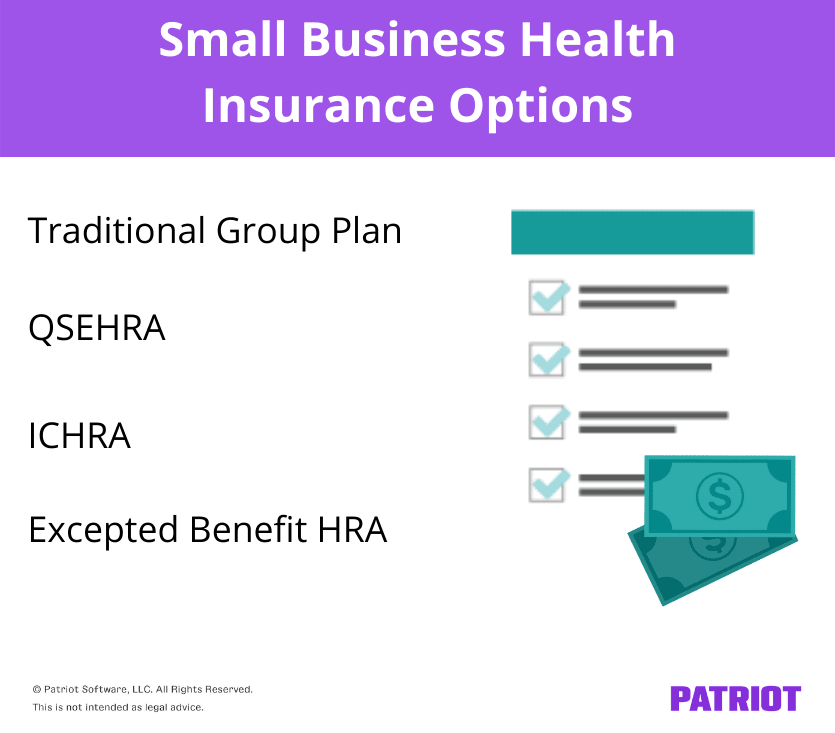Thinking about offering employer-sponsored health insurance? Sure, you could offer traditional group health insurance to your employees, but that’s not your only choice. There are several small business health insurance options you can choose from.
Why not pick the program that fits your business?
Read on to learn about small business healthcare options to help you pick one that keeps your employees (and budget) happy.
Small business health insurance options
Health insurance benefits matter … a lot … to a lot of workers. But, not all workers have the option to enroll. And those who do have access to benefits don’t always take advantage of them.
According to the Bureau of Labor Statistics, 72% of private industry workers have access to medical care benefits. And, only 46% participate in them.
This low participation rate could mean that the worker receives benefits through a spouse or parent (if they’re still a dependent). Or, it could mean that the benefits offered don’t suit their needs, and they would rather obtain insurance on their own.
Offering competitive benefits while also keeping your employer costs low is difficult for many small businesses. Unlike companies that employ hundreds of workers, small businesses may not receive the lowest rates for insurance plans.
And to top it off, employers pay approximately $5,946 for single coverage and $14,561 annually for an employee with family coverage insurance.
Luckily, small business owners have some program options and tax incentives that aren’t available to larger employers (e.g., employers with 50 or more employees).
Take a look at some of the health insurance options for small business owners below.

Traditional group plan
For many, a traditional group plan is what comes to mind when thinking about health insurance. Traditional group health insurance is where an employer chooses a plan, or plans, to offer employees. Typically, the employer foots part of the bill, and the employee pays the other part.
With a traditional group health insurance plan, employers and employees pay monthly premiums.
Employee premiums are pre-tax deductions, meaning you withhold them before withholding taxes from employee wages. The employee is also responsible for copays and deductibles associated with the plan they choose.
Take a look at some facts about traditional group health insurance plans:
- Employers choose plans to offer employees
- Employees contribute pre-tax premiums toward their plan
- Employers typically contribute a good portion of the premium cost
QSEHRA
A QSEHRA, or Qualified Small Employer Health Reimbursement Arrangement, is only available to employers with fewer than 50 full-time equivalent employees. So, what is it?
QSEHRAs are traditional group health plan alternatives that let employers reimburse employees for individually-obtained premiums and eligible medical expenses.
Typically, HRAs reimburse employees for certain medical expenses, such as medication or crutches. But, a QSEHRA is a standalone HRA that reimburses employees for premiums, too.
Here are a few fast facts about Qualified Small Employer Health Reimbursement Arrangements:
- Only small businesses with fewer than 50 full-time equivalent (FTE) employees can offer a QSEHRA
- Employers cannot offer another type of health insurance if offering a QSEHRA
- Business owners can deduct QSEHRA contributions from taxes
- Employers must offer QSEHRAs to all eligible employees
- The 2024 QSEHRA contribution limit is $6,150 for single coverage and $12,450 for family coverage
ICHRA
ICHRA stands for Individual Coverage Health Reimbursement Arrangement. The ICHRA is a health insurance program that began in January 2020.
Unlike traditional health insurance plans, employers with an ICHRA do not directly provide plans to employees. Instead, employees select their own health insurance plan, and employers reimburse them for the cost of part or all of their plan.
Individual Coverage Health Reimbursement Arrangements aren’t specific to small businesses. Any employer can offer them, but employers with 50 or more employees (i.e., applicable large employers) have to ensure the plan is affordable, which the IRS defines.
Are you thinking that this small business health options program sounds good? Before choosing this program for your workplace, keep the following in mind:
- Contributions must be consistent for employees within the same class (e.g., full-time employees or salaried workers)
- An employee does not get a choice between an ICHRA and a traditional plan—employers cannot offer both to an employee
- ICHRAs are tax-free
- Employers with 50 or more employees have stricter regulations for ICHRA reimbursements
Excepted benefit HRA
An excepted benefit HRA is a supplemental insurance option that began in January 2020. Employers can only offer an excepted benefit HRA if they also offer a traditional health insurance plan.
Excepted benefit HRAs provide coverage for premiums and expenses not included in group plans, like dental and vision insurance, copays, and deductibles.
So, how do these plans work? Through an excepted benefit HRA, employers reimburse employees for eligible expenses.
Check out some of these facts about excepted benefit HRAs:
- The annual contribution limit is $2,100 for 2024
- It must be offered in conjunction with a traditional group health insurance plan
- Excepted benefit HRAs do not pay for main health insurance premiums
Health care options for small businesses: Comparison
There are a number of differences between the small business health insurance options out there. And, understanding these differences between plans is a must.
But, one thing that’s the same across small employer health insurance options is that employees must elect coverage during open enrollment.
Not sure which is the best small business health options program for you? Use our quick-reference chart to weigh your options.
| HEALTH INSURANCE OPTION | WHO CAN OFFER? | HOW DOES IT WORK? | IS IT A STANDALONE PLAN? | DOES EMPLOYER HAVE TO OFFER? |
| Traditional Health Insurance Group Plan | Any employer | Employer offers plan and employees (and typically employers) pay premiums | Yes | Applicable large employers: Yes, unless offering ICHRA |
| Qualified Small Employer Health Reimbursement Arrangement (QSEHRA) | Small employers with fewer than 50 FTE employees | Employee purchases plan and employer reimburses part or all of it | Yes | No |
| Individual Coverage Health Reimbursement Arrangement (ICHRA) | Any employer; but, stricter regulations for applicable large employers | Employee purchases plan and employer reimburses part or all of it | Yes | Applicable large employers: Yes, if not offering traditional health insurance plans |
| Excepted Benefit HRA | Employers who also offer a traditional health insurance plan | Employer reimbursement for expenses not covered in traditional plan (e.g., dental) | No | No |
Something else to keep in mind is how taxes work. Because QSEHRAs, ICHRAs, and excepted benefit HRAs are reimbursement-based, the reimbursements are tax-free. On the other hand, premiums for a traditional health insurance group plan are pre-tax, which lowers the employee’s total tax liability.
Looking for an easy way to run payroll? Run payroll in three steps with Patriot’s online payroll. Opt for our Full Service payroll service, and we’ll deposit and report employment taxes on your behalf! Start your free trial now!
This article has been updated from its original publication date of May 20, 2020.
This is not intended as legal advice; for more information, please click here.


